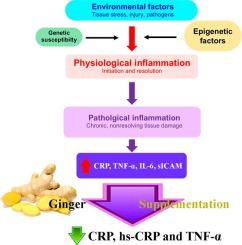Our official English website, www.x-mol.net, welcomes your
feedback! (Note: you will need to create a separate account there.)
Effect of ginger (Zingiber officinale) on inflammatory markers: A systematic review and meta-analysis of randomized controlled trials
Cytokine ( IF 3.7 ) Pub Date : 2020-11-01 , DOI: 10.1016/j.cyto.2020.155224 Mojgan Morvaridzadeh 1 , Siavash Fazelian 2 , Shahram Agah 3 , Maryam Khazdouz 4 , Mehran Rahimlou 5 , Fahimeh Agh 4 , Eric Potter 6 , Shilan Heshmati 7 , Javad Heshmati 1
Cytokine ( IF 3.7 ) Pub Date : 2020-11-01 , DOI: 10.1016/j.cyto.2020.155224 Mojgan Morvaridzadeh 1 , Siavash Fazelian 2 , Shahram Agah 3 , Maryam Khazdouz 4 , Mehran Rahimlou 5 , Fahimeh Agh 4 , Eric Potter 6 , Shilan Heshmati 7 , Javad Heshmati 1
Affiliation

|
The aim of this systematic review and meta-analysis was to investigate the efficacy of ginger supplementation on circulating levels of C-reactive protein (CRP), high sensitivity C-reactive protein (hs-CRP), tumor necrosis factor-alpha (TNF-α), soluble intercellular adhesion molecule (sICAM), and interleukin-6 (IL-6) concentrations in randomized controlled trials (RCTs). The search included PubMed-Medline, EMBASE, Scopus, Web of Science and Cochrane Library databases to identify randomized clinical trials on the effect of ginger supplementation on circulation levels of CRP, hs-CRP, IL-6, sICAM, and TNF-α published up until February 1st, 2020. We did not restrict articles based on language of publication. Standard mean differences and 95% confidence intervals were calculated for net changes in inflammatory mediators using a random-effects model. Sixteen RCTs comprising 1010 participants were found to be eligible for this meta-analysis. There was a significant reduction of circulating CRP (SMD: -5.11, 95% CI: -7.91, -2.30, I2 = 98.1%), hs-CRP (SMD: -0.88, 95% CI: -1.63, -0.12, I2 = 90.8%) and TNF-α levels (SMD: -0.85, 95% CI: -1.48, -0.21, I2 = 89.4%) following ginger supplementation. However, meta-analysis results did not show any significant impact of ginger supplementation on IL-6 (SMD: -0.45, 95% CI: -1.29, 0.38, I2 = 89.2%), and sICAM levels (SMD: -0.05, 95% CI: -0.36, 0.26, I2 = 00.0%). This systematic review and meta-analysis of RCTs demonstrates a significant impact of ginger in lowering circulating CRP, hs-CRP and TNF-α levels. Large-scale RCTs are still needed to draw concrete conclusions about the effect of ginger on other inflammatory mediators.
中文翻译:

生姜(Zingiber officinale)对炎症标志物的影响:随机对照试验的系统评价和荟萃分析
本系统综述和荟萃分析的目的是研究生姜补充剂对 C 反应蛋白 (CRP)、高敏 C 反应蛋白 (hs-CRP)、肿瘤坏死因子-α (TNF-α) 循环水平的功效。随机对照试验 (RCT) 中的 α)、可溶性细胞间粘附分子 (sICAM) 和白细胞介素 6 (IL-6) 浓度。该检索包括 PubMed-Medline、EMBASE、Scopus、Web of Science 和 Cochrane 图书馆数据库,以确定已发表的有关生姜补充剂对 CRP、hs-CRP、IL-6、sICAM 和 TNF-α 循环水平影响的随机临床试验截至 2020 年 2 月 1 日。我们不会根据出版语言限制文章。使用随机效应模型计算炎症介质净变化的标准均值差和 95% 置信区间。结果发现,由 1010 名参与者组成的 16 项 RCT 符合本次荟萃分析的条件。循环CRP(SMD:-5.11,95%CI:-7.91,-2.30,I2 = 98.1%)、hs-CRP(SMD:-0.88,95%CI:-1.63,-0.12,I2)显着降低= 90.8%)和 TNF-α 水平(SMD:-0.85,95% CI:-1.48,-0.21,I2 = 89.4%)补充生姜后。然而,荟萃分析结果并未显示补充生姜对 IL-6(SMD:-0.45,95% CI:-1.29,0.38,I2 = 89.2%)和 sICAM 水平(SMD:-0.05,95)有任何显着影响。 % CI:-0.36,0.26,I2 = 00.0%)。这项随机对照试验的系统回顾和荟萃分析表明生姜在降低循环 CRP、hs-CRP 和 TNF-α 水平方面具有显着影响。仍需要大规模随机对照试验来得出生姜对其他炎症介质影响的具体结论。
更新日期:2020-11-01
中文翻译:

生姜(Zingiber officinale)对炎症标志物的影响:随机对照试验的系统评价和荟萃分析
本系统综述和荟萃分析的目的是研究生姜补充剂对 C 反应蛋白 (CRP)、高敏 C 反应蛋白 (hs-CRP)、肿瘤坏死因子-α (TNF-α) 循环水平的功效。随机对照试验 (RCT) 中的 α)、可溶性细胞间粘附分子 (sICAM) 和白细胞介素 6 (IL-6) 浓度。该检索包括 PubMed-Medline、EMBASE、Scopus、Web of Science 和 Cochrane 图书馆数据库,以确定已发表的有关生姜补充剂对 CRP、hs-CRP、IL-6、sICAM 和 TNF-α 循环水平影响的随机临床试验截至 2020 年 2 月 1 日。我们不会根据出版语言限制文章。使用随机效应模型计算炎症介质净变化的标准均值差和 95% 置信区间。结果发现,由 1010 名参与者组成的 16 项 RCT 符合本次荟萃分析的条件。循环CRP(SMD:-5.11,95%CI:-7.91,-2.30,I2 = 98.1%)、hs-CRP(SMD:-0.88,95%CI:-1.63,-0.12,I2)显着降低= 90.8%)和 TNF-α 水平(SMD:-0.85,95% CI:-1.48,-0.21,I2 = 89.4%)补充生姜后。然而,荟萃分析结果并未显示补充生姜对 IL-6(SMD:-0.45,95% CI:-1.29,0.38,I2 = 89.2%)和 sICAM 水平(SMD:-0.05,95)有任何显着影响。 % CI:-0.36,0.26,I2 = 00.0%)。这项随机对照试验的系统回顾和荟萃分析表明生姜在降低循环 CRP、hs-CRP 和 TNF-α 水平方面具有显着影响。仍需要大规模随机对照试验来得出生姜对其他炎症介质影响的具体结论。











































 京公网安备 11010802027423号
京公网安备 11010802027423号